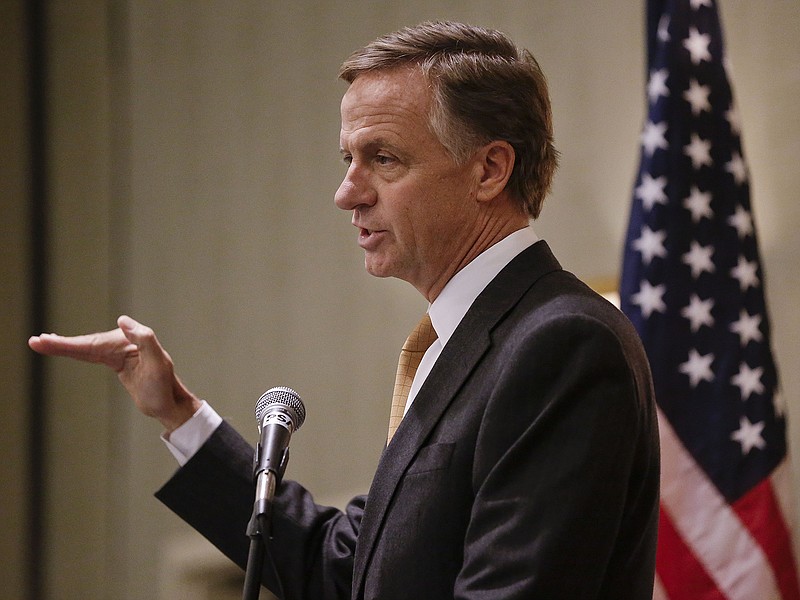During his State of the State address last week, Gov. Bill Haslam got a standing ovation from lawmakers when he proposed setting aside $97.6 million to boost Tennessee K-12 teachers' pay by 4 percent.
A more muted response came from Hamilton County school officials over that proposal and Haslam's plan to dedicate an additional $44 million toward the Basic Education Program (BEP), the state funding formula for schools.
"We're probably not going to get that much," said Christie Jordan, director of accounting and budgeting for the Hamilton County Department of Education.
That's because Hamilton County is considered to be the second- or third-wealthiest county in Tennessee. So the state education department factors in a "wealth index" and throttles down its financial contribution accordingly.
Where some poorer counties might get a larger relative percentage of state funding, "We have to come up with two-thirds of the money," Jordan said. "Because Hamilton County is a wealthy county, they expect us to chip in more money."
It costs $2.2 million for each 1 percent salary increase given to Hamilton County public school teachers, Jordan said. A 4 percent increase would cost $8.8 million -- with the state likely paying $3 million and the district paying $5.8 million.
If state lawmakers approve the teacher raises in Haslam's budget, the Hamilton County school board would be obliged to fund them at the designated level, said Sandy Hughes, president of the Hamilton County Education Association.
"The way I understand it, if the governor says to give us 4 percent raise, they have to give us 4 percent," Hughes said. "So [the school board] has to ask the commission for more funding."
The school board would need to put money for any raises in the budget it will approve in April. That budget -- and any teacher raises -- would need final approval from the County Commission, which does its budget in June.
"That would put a strain on our budget," County Mayor Jim Coppinger said. "No, we are not budgeted for that."
But Hughes believes the county can afford it.
"I'm sorry, but the county has over $100 million in their fund balance," Hughes said. "They're only required to have between $60 [million] and $65 million. If the public schools need funding, they need to put it in the school district's budget."
Haslam's proposal to increase the BEP by $44 million is just to keep up with inflation, Jordan said.
Better for rural counties
Haslam's proposal was greeted with more enthusiasm by a school official in a rural county on Hamilton County's western border.
"We'll be able to do it," Sequatchie County Schools Director Johnny Cordell said. "They have to come up with a lot more money to match [in Hamilton County]. For every [state] dollar, I'd have to come up with 20 cents."
Rural counties don't have to contribute as much, since they don't have the tax bases that large, metropolitan counties do.
"It's tough for rural systems that have no income," Cordell said. "We don't have large shopping malls and that sort of thing."
Cordell said it wouldn't be necessary to raise taxes in Sequatchie County to match state funds for teacher raises.
"Our school board manages our money well. So we're ready. We can handle it," he said.
Lawsuit brewing?
Hamilton County school board members have called on the state to boost its funding here by $12 million annually, to about $145 million. They also want the state to pay the school district's full cost for 12 months of insurance premiums, instead of the current 10 months.
The BEP underestimates actual teacher pay. It bases its calculations on an annual teacher's salary of $40,447 -- which the state acknowledges is about $10,000 too low. Using the actual 2014 average salary of $50,116, full funding would cost about $515 million, according to a November 2014 report by the Basic Education Program Review Committee.
The governor's proposal to add $44 million "isn't quite the same as $515 million," said D. Scott Bennett, the attorney for the Hamilton County school district, as well as school districts in Polk, Bradley, Grundy and Coffee counties.
Coppinger said the BEP needs adjustment.
"I'm still hopeful, on the state level, that we can eventually start the conversation and review the BEP formula," Coppinger said. "I understand the difficulties the state has with its budget, as well. Our state [legislative] delegation is working diligently to try to resolve Hamilton County's issue. And I certainly applaud that."
The governor's proposal to raise teachers' pay by $97.6 million and increase BEP funding by $44 million still needs approval from the Tennessee General Assembly.
School districts in Tennessee's four biggest metropolitan areas -- in and around Chattanooga, Knoxville, Nashville and Memphis -- have contemplated suing the state for more BEP funding. On Feb. 2, the Knox County Board of Education voted to explore the idea.
Jonathan Welch, who represents District 2 on the school board, has led the effort here to explore the feasibility of a lawsuit.
"You've got the first step, which is Knoxville, so [the lawsuit idea] is still out there," Welch said.
Republicans in Hamilton County's legislative delegation didn't favor a boost in state funding for K-12 education during a January visit to the Times Free Press.
"There is no law saying the county can't fund education," Rep. Mike Carter, R-Ooltewah, said then. "If they want to raise the taxes, let's raise them. And by 'let's,' I mean 'y'all.'"
Cordell, who's run Sequatchie County Schools for two decades, said Tennessee ranks near the very bottom of the list of states when it comes to funding schools.
"They just need to step up to the plate and fund education in Tennessee more than it is now," he said.
Cordell could see the four big school districts pursuing a lawsuit against the state.
"The rural [school] systems sued three times and won three times, so it wouldn't surprise me," he said.
Contact staff writer Tim Omarzu at tomar zu@timesfreepress.com or www.facebook.com/tim.omarzu or twitter.com/TimOmarzu or 423-757-6651.

